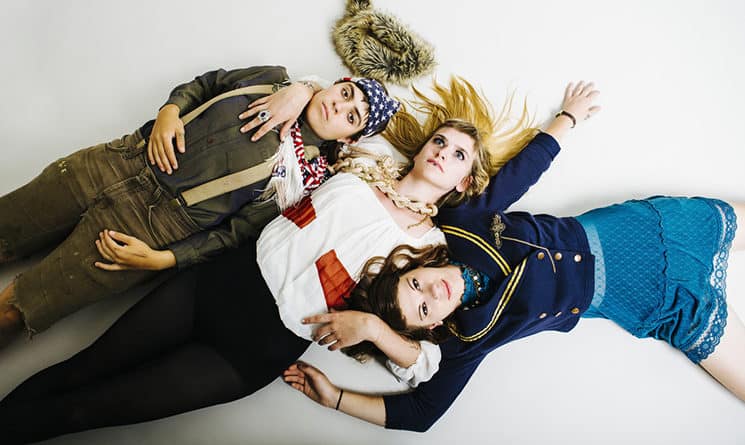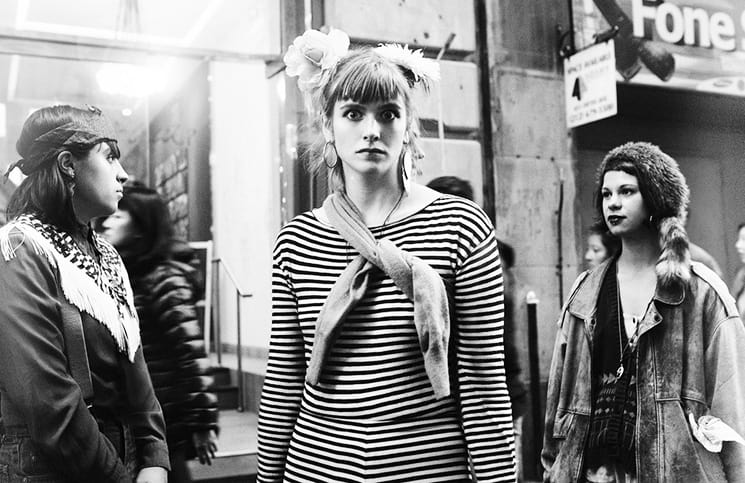And The Kids describe their creative interpretation of indie pop as “accessible unconscious existential indie glitter popsicle crisis music.” The trio, made up of Hannah Mohan, Rebecca Lasaponaro, and Taliana Katz, combines the energy of punk and the spirit of the avant-garde with unique pop sensibilities using the electric ukulele, glockenspiel, and radiant vocal harmonies. They’re exuberant stand-outs in the latest generation of musicians from Northampton, Mass. Listen to their brilliant debut full-length, “Turn to Each Other,” or experience their engrossing live sets and it’s easy to understand why they’re consistently hailed as the next big thing. Stories from The Wall Street Journal, Pitchfork, and NPR have set an appropriately high bar, but despite the pressure, And The Kids are still having a hell of a time.
A week after performing at Portsmouth Book & Bar, And the Kids return for a show alongside local favorites Tan Vampires on Sunday, Aug. 23 at 3S Artspace. The Sound reached them by phone to discuss the importance of a nurturing music scene, how to swear using different musical genres, and the latest on band member Megan Miller, a Canadian citizen who hasn’t been able to return to the U.S. since last year. Read the full version of this interview at soundnh.com.
How has the Northampton area nurtured your development?
Lasaponaro: There’s a good community of musicians here and there’s just a lot of people playing music and a lot of support from the community for musicians playing music.
Katz: One of the main things is it’s not just venue shows or DIY shows, there’s a good mix. It’s not too pretentious. I’m from New York; there’s a lot of stigma against venue shows rather than DIY shows there. Here, there’s a good mix of both and it’s very open. The supportive community is amazing.
You met at the Institute for Musical Arts (IMA). How important was that program?
Mohan: It’s so important, especially for women, to have a resource like (IMA) because a lot of being in a career that’s mostly dominated by men, is that the women tend to battle each other or compete. You see a little more competition, and around here, because we have IMA, it’s so supportive and the women are especially supportive of each other.
Katz: It seems like … sometimes there’s almost a quota for women in bands, like “oh, there’s a girl in a band so that’s OK, you’ve got the quota.” IMA is really good because it allows girls to show that they actually can do it and not settle for being the glockenspiel or a back-up singer. They’re really working their own projects … rather than just being in other people’s projects or being misrepresented.
How do you give back to your music scene?
Mohan: Me and Rebecca used to intern at the IMA, so we’d go there every summer and almost be counselors and give lessons. Now we do “Rock the Moon,” which is a new program for girls coming of age, and it’s giving them tools in life, like journalism and music and herbalism. So we do the music part in that. Also … we try to go out and see a lot of bands and try to support our friends and woman musicians.
People have been calling you folks “the next big thing.” Has that given you any insight into what being “the thing” is?
Mohan: No, we’ve been searching for that existential answer (laughs). It definitely pushes us.
What does success mean to you?
Katz: Paying rent is a big thing. The fact that none of us have day jobs or other sources of income. (That’s) great, because we can focus on playing all the time and practicing and always improving. But definitely, it’s hard.
Mohan: We couldn’t do that without the current support system that we have. Every day we’re working
Katz: Our idea of success is getting our music out there and having it resonate with people, but also not being completely financially unstable because of it. I don’t want it to seem like it’s about the money at all or anything, but it’s like in anything, you need to be comfortable.
Mohan: It’s even difficult sometimes to be creative if you have to work a job 24/7.
What’s your songwriting process like?
Mohan: It’s different now because Megan is in Canada. But a lot of it is having an idea and then jamming it out with everybody, but I mostly write everything. There’s some points that come when you know something’s missing and you just have to play it a million times with everybody and work it out and try a bunch of different stuff together.
Katz: Hannah is the main songwriter, so she’ll come with an idea. It could be as small as just one part of a song or a completely finished song. We jam … and help out with the arrangements.
Mohan: When Megan was in the band, we’d be jamming and she’d come up with a really cool keyboard line, so we’d write a song off of that.
Who has been influential in the creation of your work?
Mohan: I was actually pretty inspired by a lot of the local bands around here. If I’m thinking directly (about) songs, I would go to a show around here and think that I heard one thing that I definitely didn’t and go home and write something kind of off of that, but obviously so different.
How much of an influence are other media — books, movies, television — on your song-writing?
Mohan: I know that it plays a big part. I watch other bands talk about how, “Oh, this song is about this show,” and I laugh because I don’t think I could ever do that. Maybe it’s subconscious for me, but I just don’t realize it until later.
Katz: It doesn’t stem from any specific media, but you’re always experiencing; there are different sensory overloads all the time. I think even if it’s not blatant, it’s just impossible not to be influenced by what’s around you.
What do you do for creative outlets beyond music?
Mohan: I draw and I paint and I build stuff. I built a coffee table and I’m building a Tiki bar in the backyard right now.
Katz: We made vagina pillows and we’ve been auctioning a lot.
Mohan: I can make clothing, too. Rebecca and Taliana made these amazing cornhole games. They built it for me on my birthday. That was all Rebecca — she’s a carpenter, too.
How is Megan doing?
Mohan: I think emotionally she’s doing OK, but in the physical world, she is still not allowed in the country and they denied the waiver that she applied for. It’s been five months and they denied it. Right now we’re actively going to appeal it with letters from me and Rebecca and the manager. That’s within the next week.
You’re still hopeful?
Mohan: For sure, yeah.
Did you ever send “No Countries” (a song about Megan’s situation) to President Obama? Mohan: No, we didn’t know how. The initial idea was to put it on YouTube and put him in the subject line. But I think I gave up on trying to figure out how to do that. If you know anybody or any way, we’re open. We might try Bernie (Sanders). We’ll ask people in the running maybe, “If you can get my friend back in the country, I’ll vote for you.”
Bernie’s always in New Hampshire; maybe you’ll run into him up here.
Mohan: Maybe he’ll come to the show. Maybe he’ll see this interview (laughs).
Reading through your press, the word that comes up time and again is “fun.” Why is it important for this to be fun?
Mohan: It’s important because it’s w


